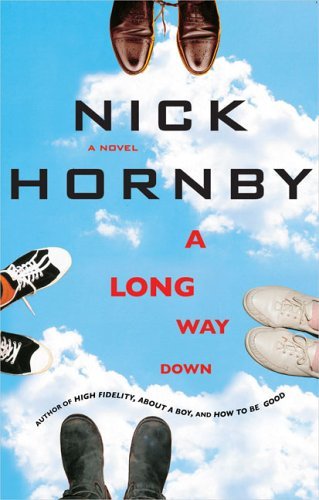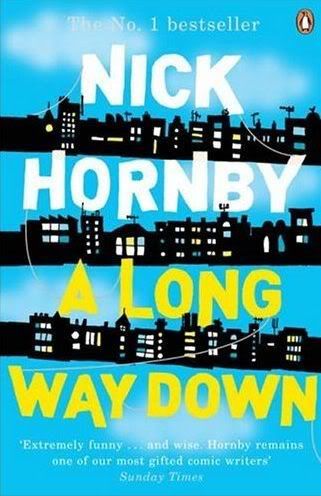
Just the other day, I finished this excellent book by an excellent writer, A Long Way Down by Nick Hornby. I was interested in reading his work because of High Fidelity (which I have never read but was a fabulous film), but a very well-read friend of mine notes him as a favorite author. He was right: it was a great book.
A Long Way Down deals with four people who go to the top of a tall building in London on the night of New Years Eve in an attempt to kill themselves. These four people develop a relationship, and I won't give any more away. But, the book deals entirely with death and suicide, and he has some VERY interesting thoughts on why people want to kill themselves or just the troubles with living.
Even though I say it's a book about death and suicide, Nick Hornby disagrees with me. This is really interesting:
"I’m not sure that this is a book about suicide – in fact, I know it’s not. I don’t want to give too much away, but a book about suicide would have some suicides in it, and…Well, this one does, and it doesn’t. My interest in the book’s initial set-up came because I wanted a chance to look at people who have hit rock bottom, at least in terms of morale. And then I wanted to find a way of leading them – literally – back from the edge, without being either sentimental or simplistic about it." -Nick Hornby
(Read more of the interview here)
There was one part that stands out in my mind: Hornby writes that they really didn't want to die. They loved life too much, and when they stopped living it, it killed them. They wanted to die because they missed life; they wanted back in. They couldn't cope from not living the life they loved. They didn't really want to die--they wanted to live.
I like how he takes on the persona of four different people who all have different reasons for killing themselves. It's interesting to see their thought processes, and it must have been cool for Hornby to get into character and ponder what or how one would think who wants to off himself.
One guy is a musician and lost touch with music because his band broke up. He wants to go out and be remembered like so many other famous artists who took the suicide route. They are legends for it; why couldn't he be?
One couldn't escape his past. One faced heart ache and didn't know how to cope. One was in a dead-end situation with a crippled love on and was stuck as caretaker. She never could do anything for herself.
So what's the point to living? What I like is that he doesn't make everything so happy and crystal clear, because that's life. He is very realistic and tries to paint his plot that way. His musing is very intellectual and in depth. It's very thought-provoking, if you want to think about these sorts of topics.
Nick Hornby on the book: "they all find something to cling to – even if, in some cases, the thing that’s keeping them afloat is not something that we would choose for ourselves. The point is that it floats, not that it’s pretty, or useful, or that it makes any sense. You don’t ask a plank of wood to make sense if you need to cling to it. The hope is, I suppose, that it might allow them to drift into shallower, calmer waters."

Here are some great quotations from the book, if you're interested in reading it:
“You know that things aren't going well for you when you can't even tell people the simplest fact about your life, just because they'll presume you're asking them to feel sorry for you. I suppose it's why you feel so far away from everyone, in the end; anything you can think of to tell them just ends up making them feel terrible.”
“You need as much ballast as possible to stop you from floating away; you need people around you, things going on, otherwise life is like some film where the money ran out, and there are not sets, or locations, or supporting actors, and it's just one bloke on his own staring into the camera with nothing to do and nobody to speak to, and who'd believe in this character then?”
“You see those pictures of people in Pompeii and you think, how weird: one quick game of dice after your tea and you're frozen, and that's how people remember you for the next few thousand years. Suppose it was the first game of dice you've ever played? Suppose you were only doing it to keep your friend Augustus company? Suppose you'd at just that moment finished a brilliant poem or something? Wouldn't it be annoying to be commemorated as a dice player?”
"All the books we own, both read and unread, are the fullest expression of self we have at our disposal. ... But with each passing year, and with each whimsical purchase, our libraries become more and more able to articulate who we are, whether we read the books or not."
"One could argue that most of the trouble in the world is caused by introspection."
"The trouble with my generation is that we all think we're fucking geniuses. Making something isn't good enough for us, and neither is selling something, or teaching something, or even just doing something; we have to be something."

"Telling me I can do anything I want is like pulling the plug out of the bath and then telling the water it can go anywhere it wants. Try it, and see what happens."
"We all spend so much time not saying what we want, because we know we can't have it. And because it sounds ungracious, or ungrateful, or disloyal, or childish, or banal. Or because we're so desperate to pretend that things are OK, really, that confessing to ourselves they're not looks like a bad move. Go on, say what you want. ... Whatever it is, say it to yourself. The truth will set you free. Either that or it'll get you a punch in the nose. Surviving in whatever life you're living means lying, and lying corrodes the soul, so take a break from the lies for just one minute."
"Once you stop pretending that everything's shitty and you can't wait to get out of it...then it gets more painful, not less. Telling yourself life is shit is like an anesthetic, and when you stop taking the Advil, then you really can tell how much it hurts, and where, and it's not like that kind of pain does anyone a whole lot of good."
"A man who wants to die feels angry and full of life and desperate and bored and exhausted, all at the same time; he wants to fight everyone, and he wants to curl up in a ball and hide in a cupboard somewhere. He wants to say sorry to everyone, and he wants everyone to know just how badly they've all let him down."
"Everyone knows how to talk, and no one knows what to say."
"I was still owed an explanation, I thought, but so what? What good was it going to do me? It wouldn't have made me any happier. It was like scratching when you have chicken pox. You think it's going to help, but the itch moves over, and then moves over again. My itch suddenly felt miles away, and I couldn't have reached it with the longest arms in the world. Realizing that made me scared that I was going to be itchy forever, and I didn't want that."
"Most people have a rope that ties them to someone, and that rope can be short or it can be long. (Be long. Belong. Get it?) You don't know how long, though. It's not your choice."
Try the book here. The first few pages are online.

So what do you think of A Long Way Down? Of Nick Hornby books? Of these quotations?

1 comment:
jguru72kf92f
golden goose outlet
golden goose outlet
golden goose outlet
golden goose outlet
golden goose outlet
golden goose outlet
golden goose outlet
golden goose outlet
golden goose outlet
golden goose outlet
Post a Comment